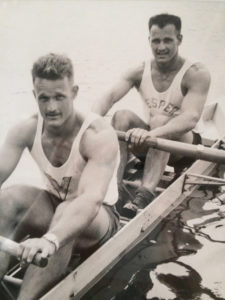The year 1964 brought a spectacular victory to Philadelphia. A gold medal at the Tokyo Olympics for the men’s eight-oared boat. In that Vesper Boat Club boat were two brothers, Tom and Joe Amlong, who are no longer with us but are begin memorialized on Boathouse Row this weekend. Below is a story I wrote for the Philadelphia Inquirer about that most unusual group of men and their heart-stopping race. I wrote a whole chapter about that race in “Boathouse Row.”

“Old men.” “A curious crew.” “A crusty bunch of adults.” That’s what the press called the eight-man crew from Vesper Boat Club as they swept the national trials and, in a huge upset, headed for the Tokyo Olympics.
The year was 1964, a half-century ago, and the ragtag Vesper crew had just upended six decades of collegiate dominance of the Olympics’ premier rowing event. Their feat also placed Boathouse Row in an international spotlight, secured its prominence as a coaching mecca, and helped catapult the sport here and around the country.
Playing a significant role was Olympian Jack Kelly, brother of Grace and son of John B., for whom Kelly Drive is named. Jack Kelly, a longtime city councilman and Vesper officer, lured the nation’s best rowers, even arguing for “special assignment” for Olympic hopefuls in the military.
Who were these men?
Tom and Joe Amlong, a brawny pair of loud-mouthed brothers in their late 20s, one in the Air Force, the other in the Army; Hugh Foley, 20, and Stan Cwiklinski, 21, quiet, hard working students at LaSalle College, which didn’t offer rowing but was close enough to the Schuylkill; Bill Knecht, 34, a father of six with a sheet metal business; and three men who had rowed in college — Marine lieutenant Emory Clark, 26, and Boyce Budd, 25, (both Yale) and Navy lieutenant Bill Stowe, 26, (Cornell).
Their 115-pound cox, Bob Zimonyi, was a 46-year-old Hungarian refugee who often muttered his commands in his native language.
“A boatload of men will beat a boatload of boys every time,” boasted their diminutive, hard-driving coach, Al Rosenberg, after his “men” outpaced the “boys” of undefeated Harvard and the University of California at the trials.
Rosenberg, who died in December 2013, [was] missed at a 2014 banquet honoring the Vesper Eight and others who competed in the ‘64 games. Theirs is an aging fraternity but their stories, to be retold at the event, are a testimony to the championship spirit that continues to draw elite rowers to Boathouse Row.
Athletes like Olympic-aspirant Vicky Opitz, 25, who trained at Vesper before competing in the World Cup last year in Switzerland, where her eight broke the world record. Her crew then nailed the World Championship in South Korea.
“Part of my decision to train in Philadelphia,” she said last week, “was its incredible history as a mecca of rowing on the East Coast and the stories that come out of there of people who are willing to push and sacrifice to accomplish their goals.”
In his diary, Emory Clark, wrote of the pain and the joy of training on the Schuylkill in the winter of 1964.
“You put the boat in and rain goes down your neck, but once you get out and warmed up it’s terrific – even if you are rigged low and you get hung up every stroke and Al calls you on your release – I enjoyed it out there tonight – lashing away at the water, cussing Zimonyi and counting strokes… Dark when we came in and still nasty. Wonderful. ….Pray that the warm weather will see an end to our aches and pains.”
Fellow rower Bill Stowe, in his 2005 book All Together wrote: “We rowed six days a week in all kinds of weather, and we killed ourselves. When we were not rowing, we weightlifted – tortured our bodies …We greeted the sun in the morning and put it to bed in the evening. … It was both wonderful and dreadful.”
It was nearly nightfall on October 15, 1964, when, in a wind-delayed race, the Vesper Eight churned its way toward the finish line, still 500 meters away. Suddenly, “there was a bright explosion and another, and I had something else for my ravaged brain to focus on,” Clark wrote. “Could we have passed the finish line? Had I so miscalculated?”
Under flares bursting to light the way, Vesper streaked across the finish five seconds ahead of the Germans. The interminable months of workouts and weights and worry were over in 6 minutes, 18.23 seconds, clinching gold for the United States and Philadelphia.
Dotty Brown is a former editor at The Inquirer, and a member of Vesper who rows only for fun.